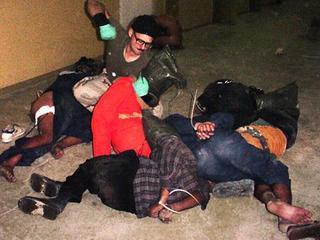DEFENSE DEPARTMENT LAWYER MICHAEL FUCCI ADMITS GUANTANAMO DETAINEES HAVE COMMITTED NO CRIME

Defense Department Deputy Counsel Michael Fucci told the Albany (Ga.) Bar Ass'n that most of these Gov't detainees are living in better conditions and eating better than they ever had
(This column ran in the 6/23/05 THE ALBANY (Ga.) JOURNAL)
When asked why the U.S. Government opposed granting fair trials to the Guantanamo Detainees, Defense Department Deputy Counsel Michael Fucci startled the audience of Albany lawyers and judges when he asserted that the detainees didn't deserve hearings because they weren't criminals and had broken no laws.
"... a state of war is not a blank check for the President when it comes to the rights of the Nation's citizens."
Supreme Court Justice Sandra Day O'Connor, writing for the majority in Hamdi v. Rumsfeld.
Recently, as embarrassing disclosures of abuses of detainees has led members of both political parties to call for the Bush Administration to close down the military prison at Guantanamo Bay, Cuba, I recalled that a few months ago one of the top lawyers in the Defense Department was unapologetic about the denial of all basic rights to foreign Muslims in the custody of the United States.
At the invitation of Dougherty Judicial Circuit District Attorney Ken Hodges, Michael Fucci, the Deputy Counsel to Defense Secretary Donald Rumsfeld, spoke at the January 2005 meeting of the Dougherty Circuit Bar Association here in Albany, Georgia. Fucci's position in the Defense Department presumably means that he was one of the architects of America's infamous policy of detaining foreign "enemy combatants" at Guantanamo Bay- a policy which has resulted in some persons being detained over three years with no charges being brought against them, and with no access to families, lawyers, or hearings in any court.
After his speech, Mr. Fucci took questions from the audience of lawyers and local judges. My question to him was posed in the context of the 1995 Oklahoma City bombing. I reminded Mr. Fucci that in April of 1995 we suffered what was then the worst terrorist attack on U.S. soil in our nation's history when the Alfred P. Murrah Federal Building was blown up, killing over 160 people. But we didn't act in a blind panic. Once we located the suspects- Timothy McVeigh and Terry Nichols- we didn't throw out the protections of the Constitution, didn't bar them from access to counsel or the courts, and didn't torture them. We didn't round up hundreds of other suspects having nothing to do with the bombing and confine them indefinitely without due process of law. I asked Mr. Fucci if he thought that in 2005 our nation is now so weak and frightened that we have to set aside everything that used to make our country great, admired, and respected- our dedication to Constitutional protection of human rights and freedom?
In defending Bush & Co.'s decision to house foreign prisoners outside of the U.S. mainland, Mr. Fucci contended that most of the detainees were living in better conditions and eating better than they ever had before their incarceration. (A position echoed last week by Republican Congressman Duncan Hunter as he did his best Julia Child impression by displaying all of the succulent foods being provided to prisoners at Guantanamo Bay.) My unspoken thought on hearing Fucci's remark: "Well, that certainly explains all the suicide attempts."
Mr. Fucci specifically mentioned the right of habeas corpus (a legal writ issued by a court to free persons detained in violation of the Constitution) as a privilege that shouldn't be extended to detainees in Guantanamo. Last year the Bush Administration had argued to the Supreme Court that it could deny detainees every right guaranteed by the Constitution and by International Law, including access to counsel, notice of charges against them, and an opportunity to be heard before an impartial tribunal to determine whether they had committed an offense warranting incarceration. Mr. Fucci's position was that the detainees didn't deserve hearings because they weren't criminals and had broken no laws- surely an admission which would surprise most ordinary Americans who assume that if you don't do anything wrong, you have nothing to fear from our government.
In June of 2004 the Supreme Court, in the cases of Rasul v. Bush and Hamdi v. Rumsfeld, rejected the clever attempt of the Defense Department to create a zone free of American law, telling the Bush Administration in no uncertain terms that:
"... as critical as the Government's interest may be in detaining those who actually pose an immediate threat to the national security of the United States during ongoing international conflict, history and common sense teach us that an unchecked system of detention carries the potential to become a means for oppression and abuse of others who do not present that sort of threat."
As Justice Sandra Day O'Connor wrote for the majority in Hamdi v. Rumsfeld:
"... a state of war is not a blank check for the President when it comes to the rights of the Nation's citizens."
Thank goodness the Supreme Court put the rule of law above the caprice of man. But if President Bush gets two more appointments to the Court, the freedoms guaranteed to all by the Bill of Rights could become no more than a fond memory.


1 Comments:
interesting topic
Post a Comment
<< Home